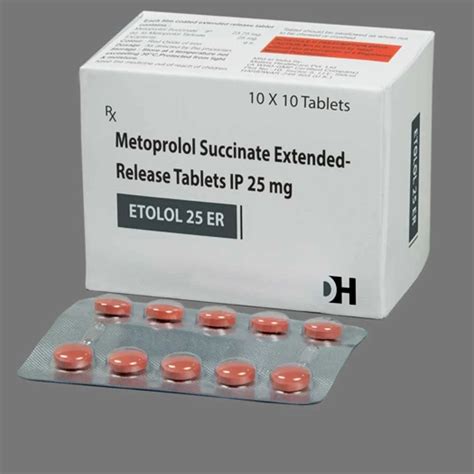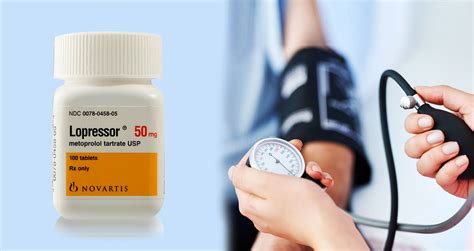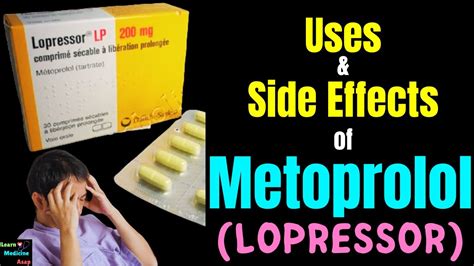Intro
Learn about Metoprolol 25mg dosage, uses, and side effects. Understand its benefits for blood pressure, angina, and heart health management, with guidance on administration and potential interactions.
Metoprolol is a widely prescribed medication for various cardiovascular conditions, including high blood pressure, angina, and heart failure. The 25mg dosage is a common starting point for many patients, especially those who are sensitive to the medication or have certain medical conditions. Understanding the proper dosage and usage of metoprolol is crucial to ensure its effectiveness and minimize potential side effects.
The importance of metoprolol in managing cardiovascular health cannot be overstated. By reducing blood pressure, heart rate, and the force of the heart's contractions, metoprolol helps to decrease the workload on the heart, reducing the risk of heart attack, stroke, and other cardiovascular complications. However, to achieve these benefits, it is essential to follow the prescribed dosage regimen carefully. This includes taking the medication at the same time every day, with or without food, as directed by the healthcare provider.
For patients who are new to metoprolol, starting with a lower dose such as 25mg can help the body adjust to the medication more easily. This approach can also help minimize side effects, which may include dizziness, lightheadedness, and fatigue. As the body adapts to the medication, the dosage may be gradually increased to achieve the desired therapeutic effect. It is crucial for patients to work closely with their healthcare provider to find the optimal dosage that balances efficacy with tolerability.
Introduction to Metoprolol 25mg

Metoprolol belongs to a class of medications known as beta-blockers, which work by blocking the effects of the hormone epinephrine, also known as adrenaline, and by slowing the heart rate and reducing its workload. The 25mg dosage is available in various formulations, including immediate-release and extended-release tablets, as well as oral solutions. The choice of formulation may depend on the patient's specific needs and preferences, as well as the healthcare provider's professional judgment.
Benefits of Metoprolol 25mg
The benefits of metoprolol 25mg are numerous and well-documented. By effectively managing blood pressure and reducing the heart's workload, metoprolol can help to: - Reduce the risk of heart attack and stroke - Improve survival rates in patients with heart failure - Decrease the frequency and severity of angina attacks - Enhance overall quality of life by reducing symptoms of cardiovascular diseaseHow Metoprolol 25mg Works

Metoprolol's mechanism of action involves the selective blockade of beta-1 adrenergic receptors in the heart, which reduces the effects of epinephrine and norepinephrine on the heart. This results in a decrease in heart rate, contractility, and cardiac output, leading to a reduction in blood pressure. The medication does not significantly affect beta-2 adrenergic receptors, which are primarily found in the lungs, thereby minimizing the risk of bronchospasm, a common side effect of non-selective beta-blockers.
Steps to Take Metoprolol 25mg
To ensure the safe and effective use of metoprolol 25mg, patients should follow these steps: 1. **Take the medication as directed**: Follow the dosage regimen prescribed by the healthcare provider, taking the medication at the same time every day. 2. **Monitor blood pressure and heart rate**: Regularly check blood pressure and heart rate to assess the medication's effectiveness and adjust the dosage as needed. 3. **Report side effects**: Inform the healthcare provider of any side effects, such as dizziness, lightheadedness, or shortness of breath. 4. **Do not stop taking the medication abruptly**: Gradually taper the dosage under the guidance of a healthcare provider to avoid withdrawal symptoms.Practical Examples and Statistical Data

Numerous studies have demonstrated the efficacy and safety of metoprolol in managing cardiovascular disease. For example, the MERIT-HF trial, which involved over 3,900 patients with heart failure, showed that metoprolol succinate significantly reduced the risk of death and hospitalization compared to placebo. Similarly, the METOPROLOL CR/XL Randomized Intervention Trial in Congestive Heart Failure (MERIT-HF) demonstrated a 34% reduction in mortality among patients treated with metoprolol compared to those receiving conventional treatment.
Common Side Effects and Interactions
While metoprolol is generally well-tolerated, common side effects may include: - Dizziness or lightheadedness - Fatigue or tiredness - Shortness of breath - Nausea or vomiting - Diarrhea or constipationMetoprolol can also interact with other medications, such as:
- Calcium channel blockers
- Anti-arrhythmic medications
- Beta-agonists
- Nonsteroidal anti-inflammatory drugs (NSAIDs)
FAQs

What is the typical starting dose of metoprolol for high blood pressure?
+The typical starting dose of metoprolol for high blood pressure is 25mg once daily, which may be gradually increased to achieve the desired therapeutic effect.
Can I take metoprolol with other medications?
+Metoprolol can interact with other medications, so it is essential to inform your healthcare provider of all medications you are taking, including prescription and over-the-counter medications, vitamins, and supplements.
What are the common side effects of metoprolol?
+Common side effects of metoprolol include dizziness, fatigue, shortness of breath, nausea, and diarrhea. If you experience any of these side effects, inform your healthcare provider, who may adjust your dosage or recommend alternative treatments.
Conclusion and Future Directions

In conclusion, metoprolol 25mg is a valuable medication for managing cardiovascular disease, offering numerous benefits, including reduced blood pressure, heart rate, and risk of cardiovascular complications. By understanding the proper dosage, mechanism of action, and potential side effects, patients can work closely with their healthcare providers to achieve optimal therapeutic outcomes. As research continues to uncover the complexities of cardiovascular disease, the role of metoprolol and other beta-blockers is likely to evolve, offering new opportunities for improved patient care and outcomes.
We invite you to share your thoughts and experiences with metoprolol in the comments section below. If you found this article informative, please consider sharing it with others who may benefit from this information. Your engagement and feedback are invaluable in helping us create high-quality content that addresses the needs and concerns of our readers.
